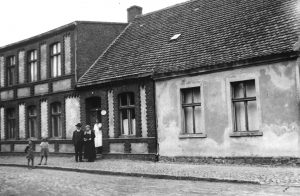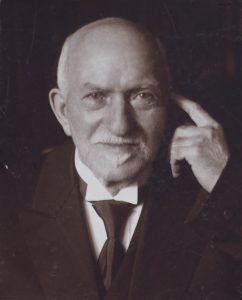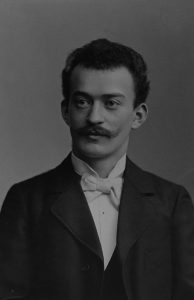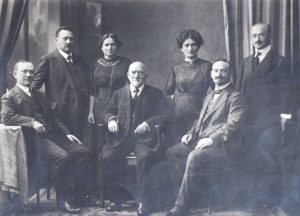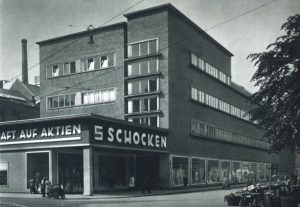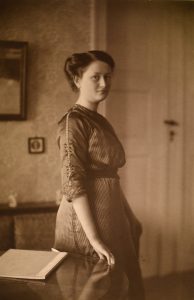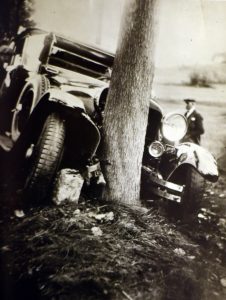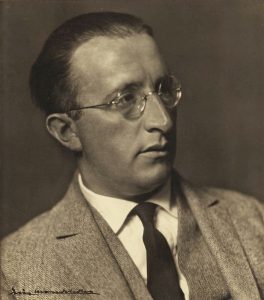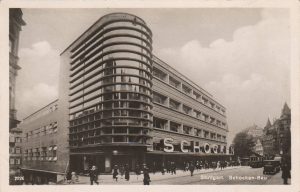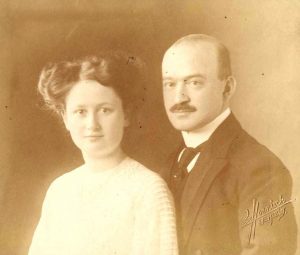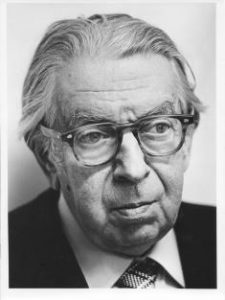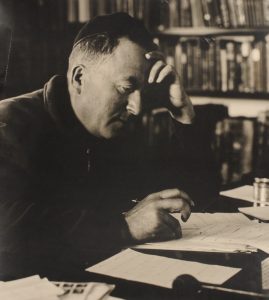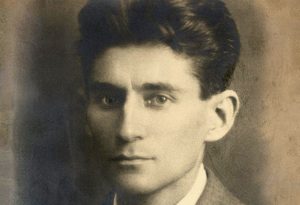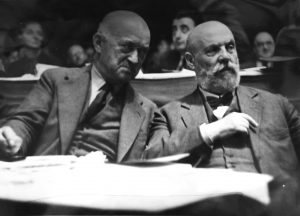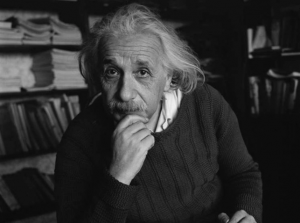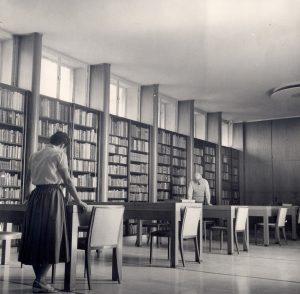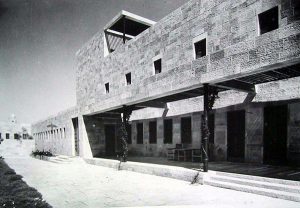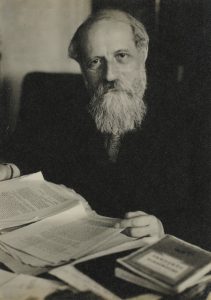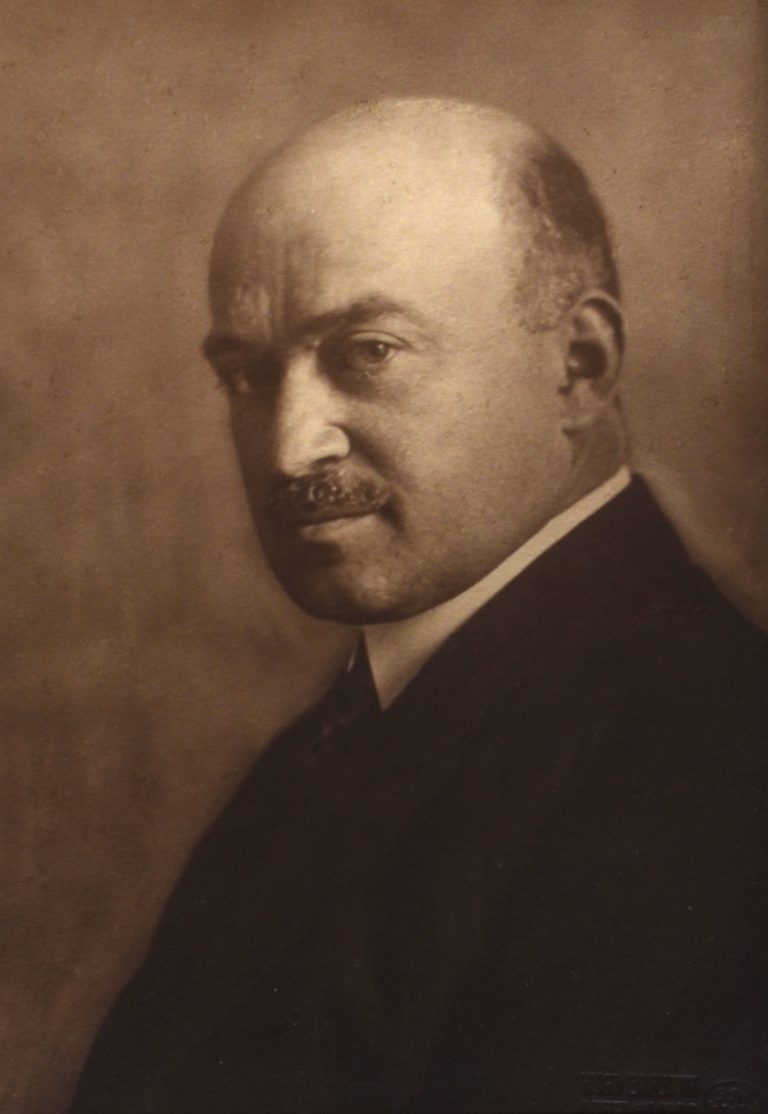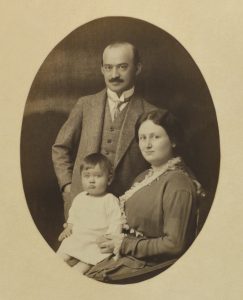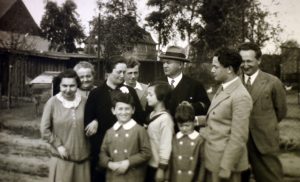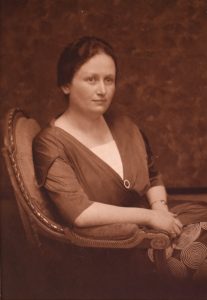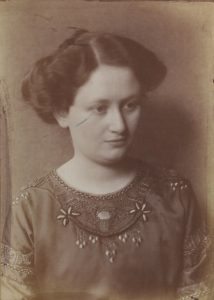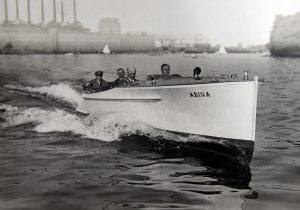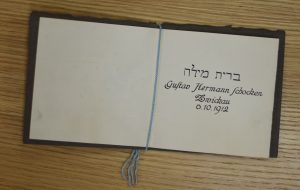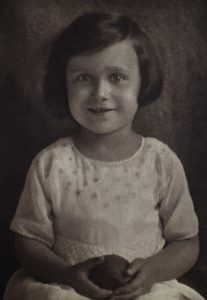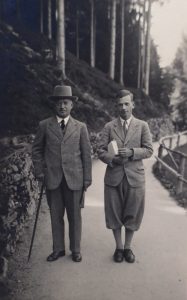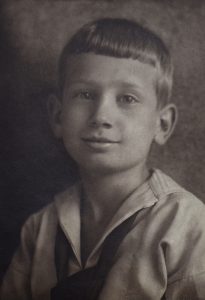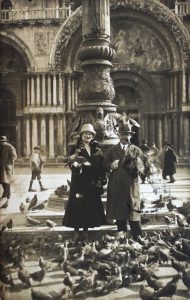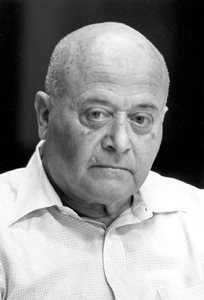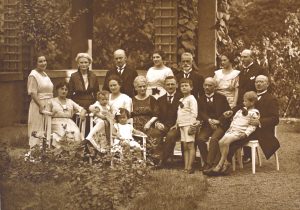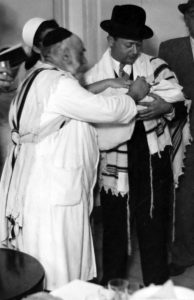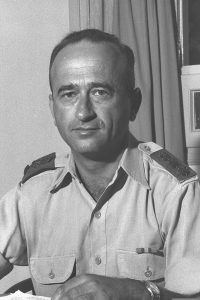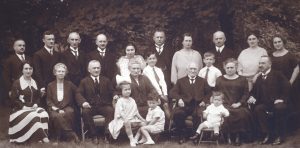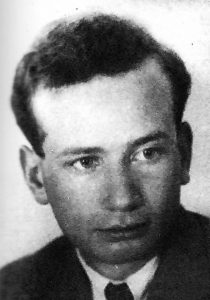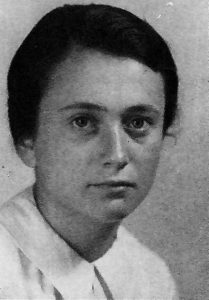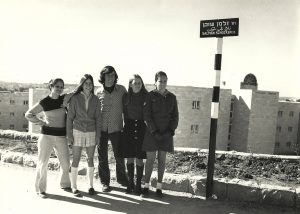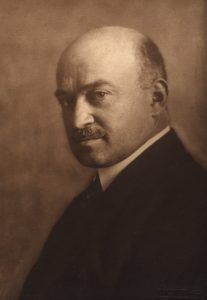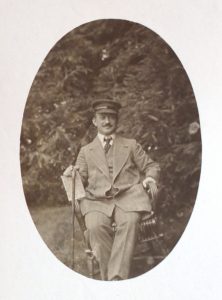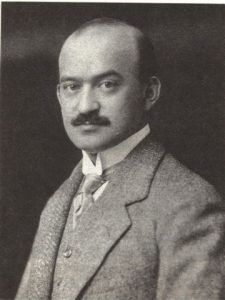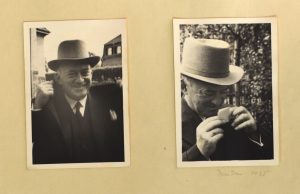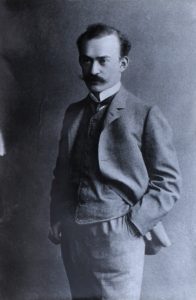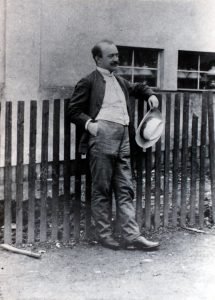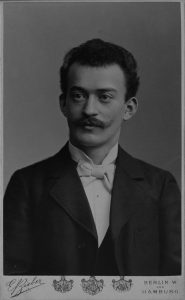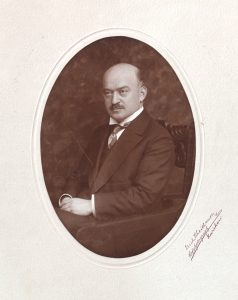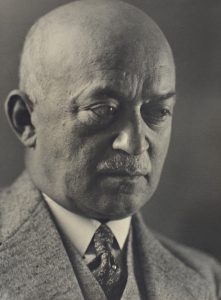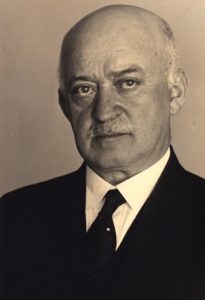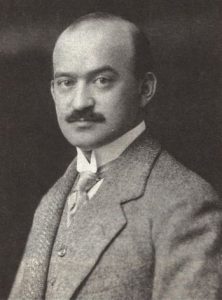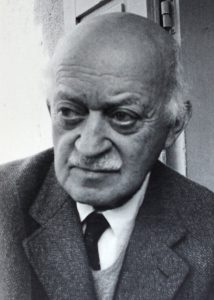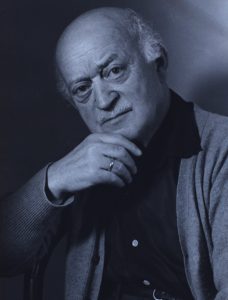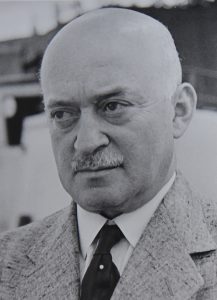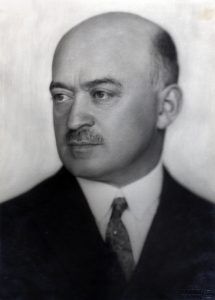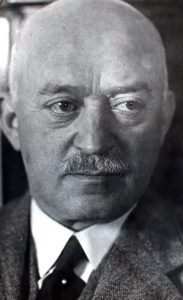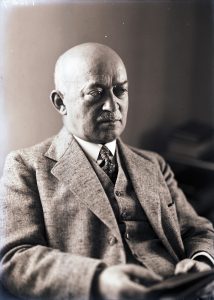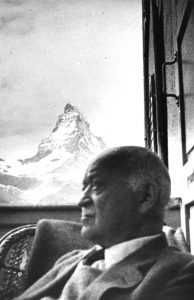Life
Salman Schocken’s Jewish ancestors wandered for generations around small towns in the Prussian province of Posen, now part of Poland. Schocken’s grandfather, Abraham, was born and raised in a township named Schocken. He later moved to Margonin, where he worked as a shopkeeper. Salman’s father Isaac was born in 1838. Like his Eastern European ancestors, Isaac was a Yiddish speaking, devout Jew. He was drafted to serve in the Prussian army, and made a scant living working as a tailor.
Isaac and Eva Schocken had six children, including Salman, who was born in 1877. Unable to afford the cost of schooling, Isaac was forced to send his children to work. At the age of 14, Salman became an apprentice in a garment business, following the footsteps of his father Isaac and his older brother, Simon.
Seeking to escape poverty and persecution, many Posen Jews emigrated to America, Australia, England, and South Africa. Following the unification of Prussia and Germany by Bismarck in 1871, a second wave of Posen Jews emigrated to Germany, where they were greeted with the derogatory nickname “ostjuden” (“Jews from the East”). Among them was Salman Schocken, who moved to the German town Zwickau, in Saxony. In 1901 he joined his brother Simon in running a local department store, which they managed to buy three years later. In 1910 Salman Married Lilli (Zerline) Ehrmann, who was born in Frankfurt.
Between the years 1907 and 1931, and starting from this humble origin, the two Schocken brothers built Germany’s fourth largest retail chain, with 20 department stores spread all over the country. The chain’s anchor stores were designed by Erich Mendelsohn, Salman Schocken’s protégé and favorite architect. In 1929, Simon Schocken died in a car accident, leaving his share of the company to Salman.
Despite his prominent stature as sole owner of the Schocken chain, Salman never forgot his humble “ostjuden” origins. “Posen Jews”, said Schocken, “were mobile, adaptable, and ambitious”. Rather than succumbing to parents, state, religion, or tradition, these Jews on the move were determined to craft their own destiny.
In Zwickau, Salman and Lilli Schocken bore five children: Gustav (Gershom), Theodore (Ted), Eva (Chawa), Micha (Josef), and Gidon (Walter). Breaking from the Orthodox religion of their ancestors, the Schocken family embraced a secular, Jewish-German lifestyle. Yet Schocken was always deeply interested in Jewish culture and lore. He supported numerous Jewish scholars, and hired the renowned author Nahum Glatzer to teach his children Hebrew. In 1924, the Schocken family moved from Zwickau to a spacious villa in Zehlendorf, an upscale Berlin suburb.
Schocken’s response to the rise of fascism in Germany in the 1930’s was a cultural initiative. He used his financial resources and management acumen to build the country’s largest Jewish publishing house – Schocken Verlag. He specialized in publishing authors who were turned down by German publishers, including the collected works of Franz Kafka, who was otherwise banned in Germany. He also published and mentored S.Y. Agnon, who won the Nobel prize in literature forty years later.
Schocken joined the Zionist movement as early as 1911, and became a prominent delegate in several Zionist Congressional meetings. The vision of seeking refuge in Palestine became a reality in 1934, when the Nazi regime forced Schocken to sell his business empire for a fraction of its real value. Salman and Lilli Schocken left Germany with their children Gidon, Chawa, and Micha. One of the sons, Theodore (Ted), stayed behind to run the little that remained of the Schocken business. He managed to escape Germany in 1939, and joined the family later.
The Schocken family relocated in Jerusalem, where Salman accepted Albert Einstein’s and Chaim Weizmann’s pledge to take over the administration of the newly founded Hebrew University. In 1936 Schocken bought Haaretz, a small newspaper, and inaugurated the Schocken Library in Jerusalem. In 1939 he launched the Schocken Publishing House in Tel Aviv. In 1940 he and Lilli relocated to the USA, where he founded Schocken Books in New York.
Between leaving Germany in 1934 and until his death in 1959, Schocken wandered between Israel, America, and Europe. He died in Pontresina, his favorite Swiss resort. His hotel room was unlocked, and a waiter who stepped in found his body slumped over a chair. Schocken died in peace, with Goethe’s book Faust firmly clutched in his hand. On the nightstand was another of his favorite books, Martin Buber’s The Stories of Rabbi Nachman, exquisitely bound and published by Schocken Verlag in Berlin.
Gidon, Theordore, Chawa, Gustav and Micha Schocken
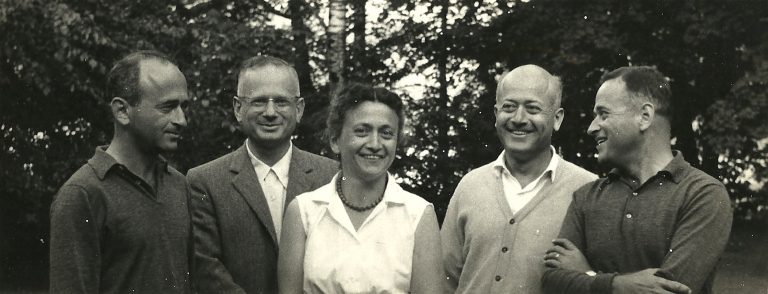
Children
Schocken’s oldest son, Gustav, who adopted the Hebrew name Gershom, ran the publishing house in Tel Aviv, and turned Haaretz into the country’s finest daily newspaper. After serving as a U.S. Army intelligence officer during World War II, Ted moved to New York as did his sister Chawa. Over the years, Ted, Chawa, and her husband Herzl Rome were actively involved in running Schocken Books in New York. Gidon volunteered to the British army, and served during World War II in the North African and Italian campaigns. He later became a General in the Israeli Defence Forces. Micha, the youngest son, studied in the USA, moved to Israel, and became one of the country’s first industrial engineers and factory managers.
Gershom (Gustav) Schocken
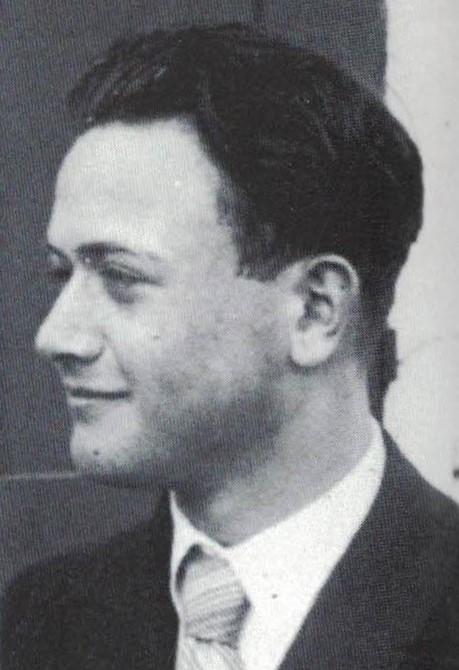
Gershom Gustav Schocken was born in 1912 in Zwickau, Germany, the first son of Salman and Lilli Schocken. When he was 12 the family moved to Berlin, where they lived in a spacious house in Zehlendorf. In 1932 he enrolled at Heidelberg University, where he studied for only one year before Hitler came to power. In 1933 he moved to Israel (Palestine at the time), where he was known by his adopted Hebrew name, Gershom.
In 1935 Gershom started his studies at the London School of Economics. After getting engaged with Shulamit Persitz, he was ordered by his father to start earning a living. He dropped out of college, moved back to Tel Aviv, and married Shulamit in 1936. Following a brief stint at the Anglo-Palestine Bank (now Bank Leumi), Gershom traveled to the United States, for a study tour of the American newspaper industry. He was then appointed editor in chief of Ha’aretz, the daily newspaper his father had bought four years earlier. After Salman Schocken’s death in 1959 he became the publisher of Schocken Publishing House in Tel Aviv.
Under Gershom’s long leadership as publisher and chief editor (1939-1990), Ha’aretz became a modern and sophisticated daily newspaper. Today, Ha’aretz is a lively arena for political, economical, social and cultural debates, and the most quoted Israeli newspaper in international media. Gershom also served as a member of Israel’s parliament, Knesset, for the Progressive Party, between 1955 and 1959. He published a book of poems, Occasional Pieces, under the pseudonym Robert Posen.
Gershom and Shulamit had three children: Racheli (born 1942), Publisher of Schocken Publishing House, Amos (born 1944), Publisher of Ha’aretz, and Hillel (born 1947), an architect. Gustav separated from his wife Shulamit in 1964. He then lived with his partner Yehudit Yona until his death in 1990.
Gershom’s children fondly remember Friday evenings after dinner in his library, when he read them Bible stories as well as classics like Grimm’s folktales that he simultaneously translated from German to Hebrew. He exposed them to the world of art through the numerous art books in his large library. Classical music was usually played on Saturdays. He also shared his immense knowledge with his children during trips in Israel and abroad. In one trip to Athens, he gave them an unforgettable experience when they climbed the Acropolis hill on foot three times in one day, in order to experience the effect of the changing light. There was a thorough visit to the Vatican museum with three kids dragging behind, and long bicycle trips in Israel’s Western Galilee as well as numerous trips to archeological sites in Israel.
Theodore (Ted) Schocken
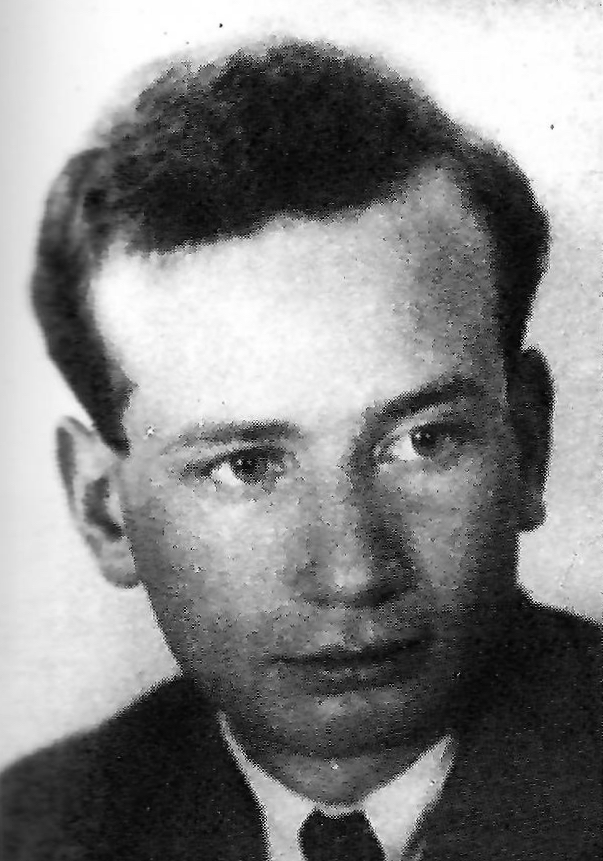
Theodore (Ted) Schocken, second son of Salman and Lilli Schocken, was born in Zwickau in 1914. Dropping out of high school at 16, he turned to a private tutor and attended a local business school. In 1931 he began working in the Schocken department stores. After his parents and siblings left Germany in 1934, he stayed behind. He became acting head of all the Schocken stores at the age of 20, along with his cousin, Georg Spiro. In 1939 he left for Palestine, and in the same year immigrated to the United States.
Although he had neither a high school diploma nor an undergraduate degree, Ted was accepted to graduate studies at Harvard University. He received an MBA in 1940, and moved to Chicago where he worked for Sears, Roebuck and Company for two years. In 1941 he married Dora Landauer, whom he had met years earlier in Germany. After becoming an American citizen, Ted enlisted in the U.S. army. He was trained as an intelligence officer, and served in North Africa and then in Europe. His working experience in small German towns proved an advantage when interrogating German prisoners. After the war ended, Ted and Dora moved to New York, where they had three daughters: Miriam, born in 1945, Naomi in 1946, and Eva in 1949.
In New York, Ted started working with his father Salman at Schocken Books. Yet after struggling with his father’s authoritarian ways, he left the company in 1952, and opened his own retail store, first in Poughkeepsie and then in Yonkers. After Salman’s death in 1959, Ted became publisher of Schocken Books. He managed the publishing house together with his brother in law, T. Herzl Rome, and, following Herzl’s death, together with his sister and Herzl’s wife, Chawa Rome. The years that he worked in the family business and revitalized its operations were the most rewarding of his life. He died in 1975.
Although he worked as a businessman most of his life, Ted had a deep love of literature, especially poetry. Though not a natural athlete, he enjoyed skiing, horseback riding, swimming, and in his later life took up yoga. He was a soft spoken, mild mannered and approachable man who lacked the bullheadedness and aloofness of his father. He thoroughly enjoyed being with young people and was very family minded. He provided financial and emotional support to less fortunate cousins who fled Germany.
Chawa Schocken
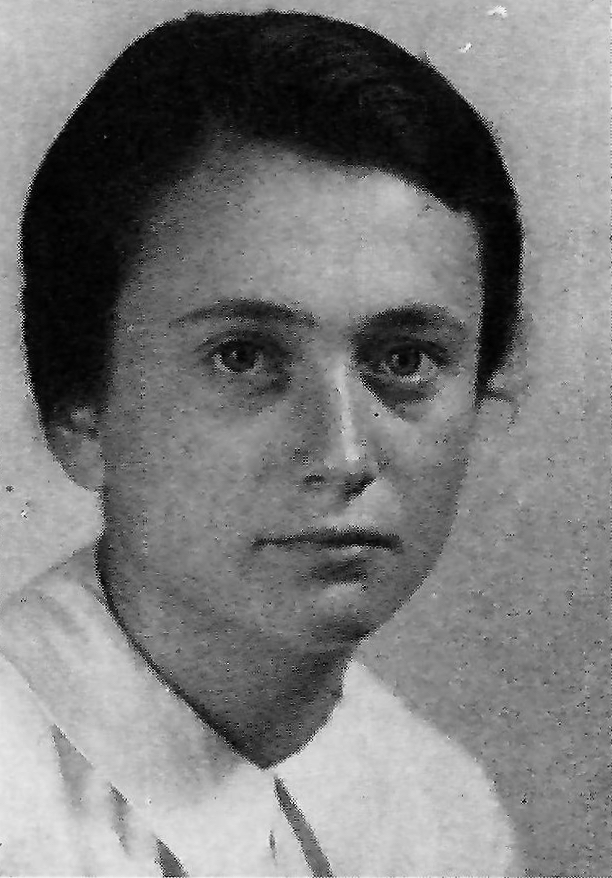
Chawa (Eva), third child and only daughter of Salman and Lilli Schocken, was born in 1918 in Zwickau, where she grew up until the family moved first to Berlin and then to Jerusalem in 1934. She continued her education in Jerusalem and later in England. In the late 1930’s Chawa followed her older brother Theodore to the United States, where she continued her education at Bank Street College and Teachers College of Columbia University, receiving a Master’s degree in education from the City College of New York.
In 1941 Chawa married Theodor Herzl Rome, a Harvard-educated artist with whom she had four children – Nathan, David, Dan and Abigail. After the death of Salman in 1959, Herzl Rome took over direction of Schocken Books in New York together with Theodore Schocken, greatly enlarging its publishing program and pioneering the publication of what is called today trade paperback editions in a broad range of subjects. Chawa joined the publishing house as an editor and later as president, expanding its program to include groundbreaking books in educational theory and practice, women’s studies, child development, and psychology. In the mid-1960’s she reprinted the long-neglected works of Maria Montessori, making an important contribution to the revival of Montessori’s pedagogy and the rapid spread of Montessori schools in the United States, Canada and elsewhere.
Following Herzl Rome’s death in 1965, Chawa married Julius Glaser, becoming stepmother to his daughters SueAnn and Debi. Following Chawa’s death in 1982, Julius presided over Schocken Books. Son David Rome and niece Miriam Schocken ran the firm in the mid-1980s, before negotiating its sale to Random House in 1987.
Chawa treasured family summers on Cranberry Island, Maine, where she loved to bake breads and cakes, pick and can blueberries and cranberries, host relatives and friends, and relax in a private window-seat at the back of the kitchen. She was famous for the delicious challah she baked every week year-round for Friday night Kiddush, following a recipe handed down from her mother. She was much loved by her four brothers, and her cherished memory lives on in the hearts of her four children.
Gidon Schocken
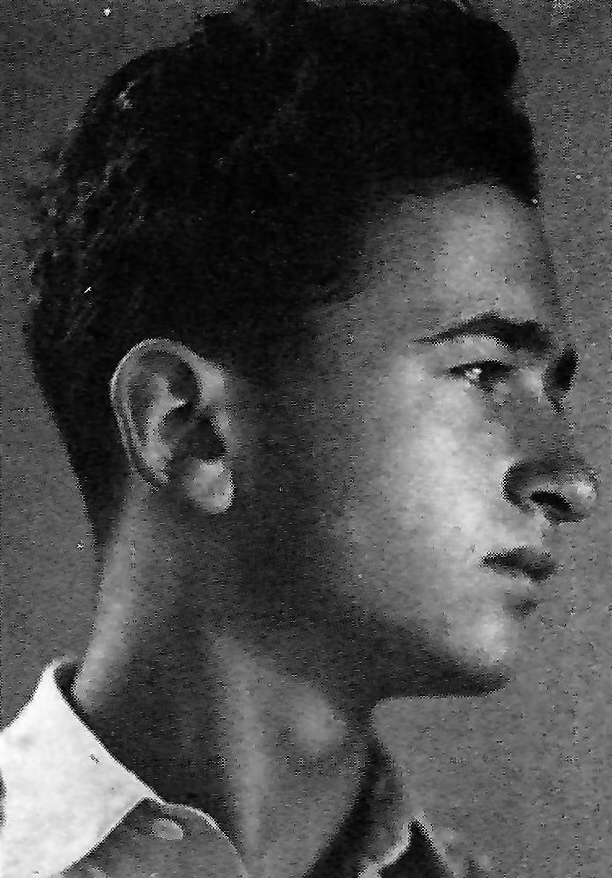
Gidon (Walter) Schocken was born to Lilli and Salman Schocken in 1919, in Germany. He immigrated to Palestine with his family in 1934, and studied in the Gymnasia Rehavia high school in Jerusalem, where he met his future wife, Dvora Cohen. In 1936, Gidon joined the Haganah, an underground organization that sought to overthrow the British mandate in Palestine and gain national independence to the Jewish people. This campaign ended in 1949, when the Independence War was won and the nascent Jewish state in Palestine became Israel.
Parallel to his underground activities, in which he completed a platoon commanders course and became an officer, Gidon studied classics at the Hebrew University in Jerusalem. In 1938 he enrolled at Oxford University. When World War II erupted a year later he dropped out and volunteered for the British Army. He served in the Jewish Brigade, fighting in North Africa and in Italy. He was discharged from the British Army eight years later, in 1946, at the rank of Major.
During World War II, Gidon visited Jerusalem several times. In one visit he married Dvora, in Villa Schocken in Rehavia. In another visit he met his first-born daughter Yael for the first time, when she was two years old. After the war ended Gidon moved with Dvora and Yael to New York, where he helped his father Salman start up the new Schocken Books company. After running Schocken Books for one year, Gidon moved back to Israel and joined the IDF, Israel’s Defense Forces. He rose to the position of chief of the IDF Manpower Division, at the rank of General.
During his military service, Gidon planned and built the infrastructure that enabled the IDF to operate in its present form: a small permanent army that relies on a much larger contingent of reserve units, mobilized during war time. His combined experience as an underground fighter and ordinary officer in the British army was invaluable in this undertaking. Gidon retired from the IDF in 1961. He continued to work in the public sector, becoming commissioner of the Israeli security forces in the office of Israel’s State Comptroller. He then joined Bank Leumi, where he served as board member and vice president of human resources.
Gidon was a gifted painter and photographer. He designed the first book covers of Franz Kafka’s English publications, and produced beautifully decorated batik scarves for his wife and daughters. Although he never completed a college degree, he was an expert in classics and English poetry. At some point he took a year off from his work, and dedicated it to reading James Joyce’s Finnegan’s Wake. Endowed with an artist’s spirit, Gidon always felt out of place in his military and business careers. He died in 1981.
Gidon and Dvora were avid art collectors. They were mentors and friends of many Israeli artists, as well as the internationally acclaimed artist Bernard Reder. When Dvora opened an art gallery in Tel Aviv, Gidon supported her enthusiastically. She later became curator and co-founder of the Herzliya Museum of Contemporary Art, and co-founder of the Marcel Janco Museum in Ein Hod. Gidon and Dvora had two daughters, Yael Miron (1943-1975), and Tamar Topaz (1947-1992), and a son, Shimon Schocken (born 1954), who is a computer science professor and author.
Micha Schocken
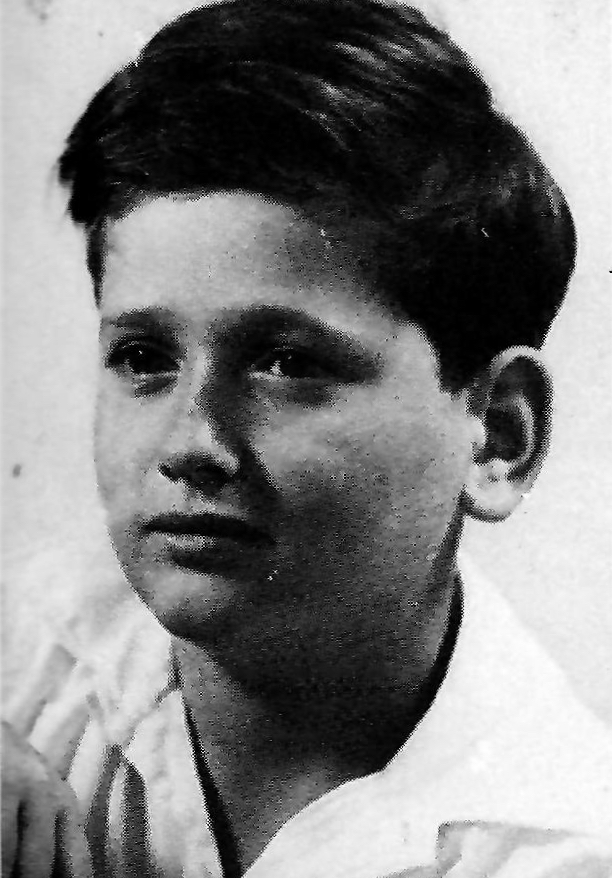
Micha Josef Schocken was the fifth and youngest child of Salman and Lilli Schocken. He was named after Micha Josef Berdyczewski – a renowned Jewish writer. Micha was born in Zwickau, Germany in 1923, and moved to Palestine with his mother Lilli and his brother Gidon on his 11 birthday, in 1934. In Jerusalem he attended an elementary school that was founded by a German Jew, Dr. Menchel, and then studied at the Gymnasia Rehavia high school in Jerusalem.
In 1940, Micha moved with his parents to the United States, where his father founded the Schocken Books company. Micha completed his high school education in Evanston, Illinois, and went on to study at Purdue University. He graduated in 1945 with a degree in Industrial Engineering.
After returning to Israel, Micha was one of the nation’s first industrial engineers. Throughout his career, he played key roles in major industrial projects: operation manager of the print department of the Haaretz daily newspaper, operation manager of ATA, the biggest textile factory in Israel, co-general manager of American Israeli Paper Mills, and co-general manager of Magam-United Rubber companies. Micha introduced advanced industrial processes, modernized factories, and was active in Israel’s Manufacturers Association and Plastics and Rubber Center. As a prominent engineer, he was chosen to represent Israel in numerous delegations to Europe and the USA.
In 1950 Micha married Shulamit Feigenberg, and had two daughters: Noa and Becky. In the wake of deafness problems that ran in the family, Micha was on the board of Beit Micha, an institute for hearing impaired and deaf children. Using his engineering skills, Micha invented innovative technological accessibility solutions for deaf people.
Micha was a shy, introverted and warm-hearted man, who took on the responsibility of being the custodian for ill family members. At home he enjoyed repairing his car and fixing the house. He had a weakness for gadgets, and was very fond of his HP calculator, one of the first in Israel. He was also an amateur painter. His untimely death at the age of 58 left his family shocked and grieving.
Timeline
-
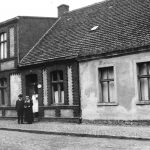
1877
Born in Margonin, province of Posen, German Empire (now part of Poland)
-
1891
Takes an apprentice position in the village of Samotshin. -
1895
Takes a job at a wholesaler in the town of Gnesen. -
1898
Moves to Berlin, to work in a wholesale business. -
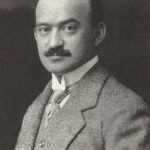
1900
Works as a traveling salesman for a textile firm in Leipzig -
1901
Moves to Zwickau, to join his brother Simon in managing a department store for the company Ury Brothers -
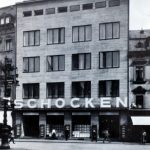
1904
joins Simon to launch their own store in Zwickau. -
1907
Buys the Ury store and sets up a common distribution center to serve both stores. -
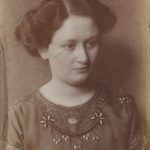
1910
Marries Lilli (Zerline) Ehrmann, a twenty-year-old woman from Frankfurt. -
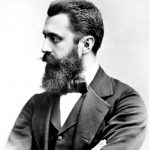
1911
Joins the Zionist movement. -

1914
Completes the opening of additional stores in the working-class towns of Meissen, Frankenberg, and Planitz. The Schocken chain operates nine stores. -
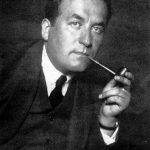
1915
Meets the Hebrew novelist S.I. Agnon. -
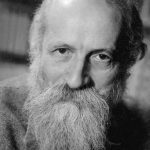
1917
Supports Martin Buber’s literary magazine Der Jude. -
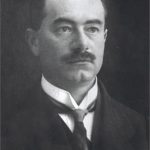
1921
First trip to Palestine, Invited by Arthur Ruppin. -
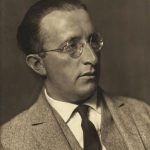
1922
Meets the architect Erich Mendelsohn. -
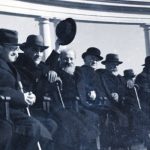
1925
Second trip to Palestine; Invited to the opening ceremony of the Hebrew University In Jerusalem. -
1928
Buys 3,000 Hebrew poetic works discovered in the attic of the deserted Ben Ezra Synagogue in old Cairo. -
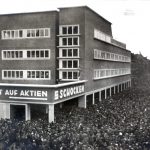
1930
Completes the expansion of the Schocken chain with additional department stores in Nuremberg (1926), Stuttgart (1928), and Chemnitz (1930). -
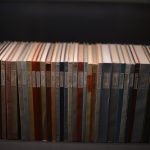
1931
Founds the book publishing company Schocken Verlag in Berlin.
-
1931
Opens a department store in Berlin. The Schocken chain is the fourth largest in Germany. -
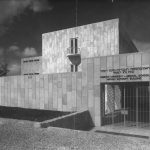
1934
Leaves Germany and relocates in Jerusalem; elected to chairman of the Hebrew University’s executive committee.
-

1936
Buys Haaretz, a small newspaper in Tel Aviv; Inaugurates the Schocken Library in Jerusalem. -
1938
Forced by the Nazi regime to sell the department stores for a fraction of their value. -
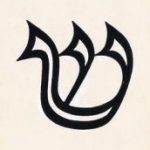
1939
Launches the Schocken Publishing House in Tel Aviv. -
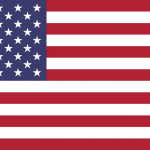
1940
Relocates in the USA. -
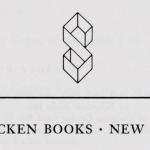
1945
Founds Schocken Books in New York. -
1949
Regains control over some of his confiscated department stores in West Germany. -
1953
Sells the department stores in West Germany. -
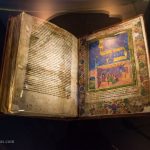
1957
Receives the Nuremberg Machzor as a part of a reparations package for losses incurred during the Nazi period. -
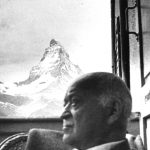
1959
Dies during a vacation in Switzerland.
